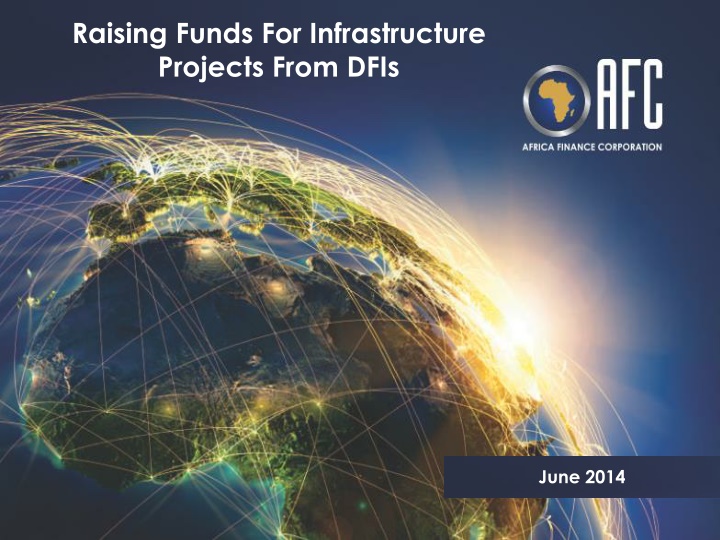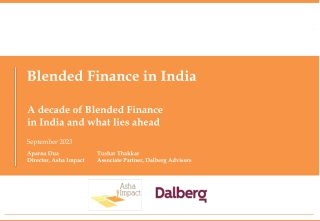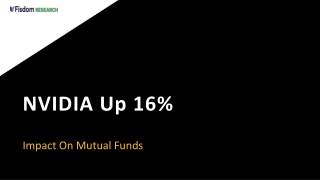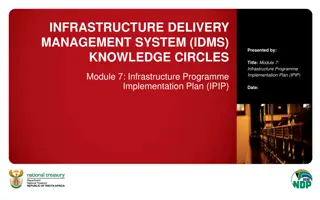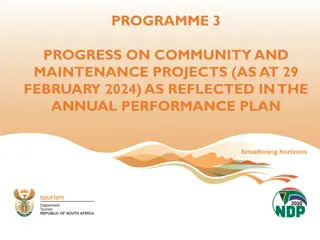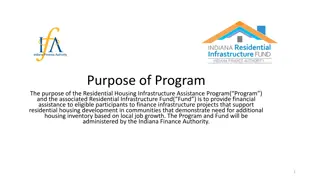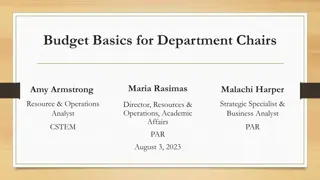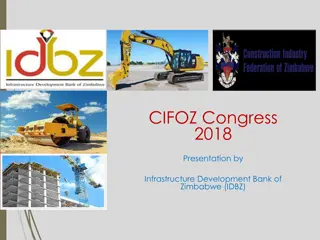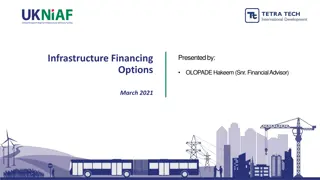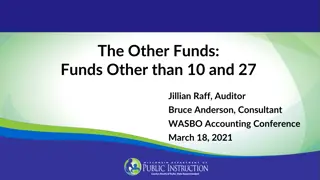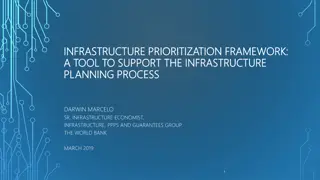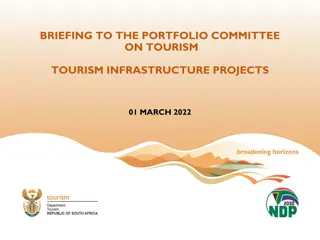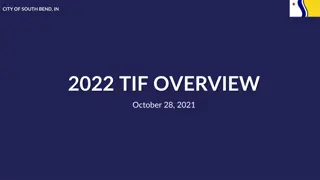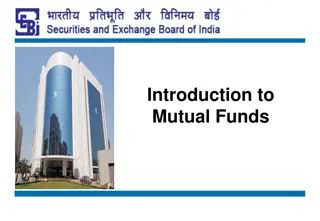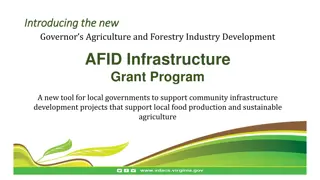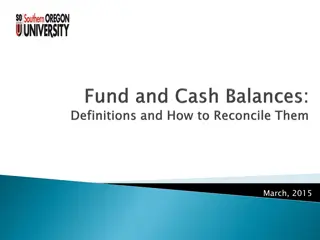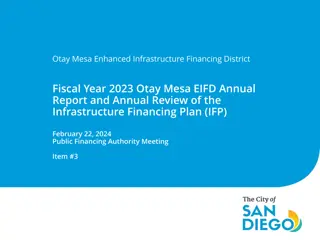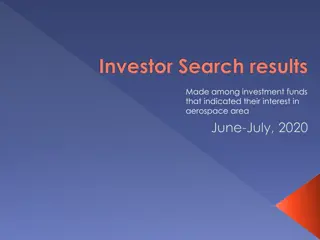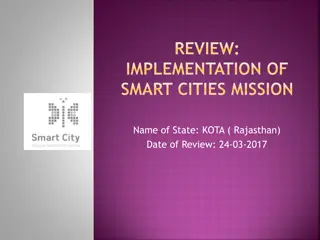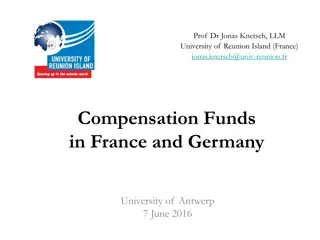Raising Funds for Infrastructure Projects from DFIs
Africa Finance Corporation (AFC) is a key player in addressing Africa's infrastructure needs through long-term financing solutions. With a focus on sectors like natural resources, power, telecoms, and heavy industry, AFC offers a range of financial products to support projects with high development impact. Membership in AFC spans across various African countries, reflecting its commitment to regional development. The corporation's expertise lies in sectors with high profit and development impact potential, such as natural resources, power, transport infrastructure, and heavy industries.
Download Presentation

Please find below an Image/Link to download the presentation.
The content on the website is provided AS IS for your information and personal use only. It may not be sold, licensed, or shared on other websites without obtaining consent from the author.If you encounter any issues during the download, it is possible that the publisher has removed the file from their server.
You are allowed to download the files provided on this website for personal or commercial use, subject to the condition that they are used lawfully. All files are the property of their respective owners.
The content on the website is provided AS IS for your information and personal use only. It may not be sold, licensed, or shared on other websites without obtaining consent from the author.
E N D
Presentation Transcript
Raising Funds For Infrastructure Projects From DFIs June 2014
Outline Introduction to The Africa Finance Corporation (AFC) Advantages & Misconceptions About DFI Financing Raising Funds From DFIs: Risks, Process Conclusion 2
The Africa Finance Corporation AFC, formed to help fill a void in Africa s infrastructure AFC is a private sector led, International finance institution Established by international agreement in 2007 Formed to help address Africa s infrastructure needs by providing long term financing solutions Carefully selected focus sectors that have both a high development impact and strong investment returns These include: Natural resources (Oil and gas, mining),power, telecoms, transport and heavy industry Ability to participate across the capital structure using a number of products: technical & financial advisory, project finance, equity, convertibles, mezzanine, finance and project development AFC has US$ 1.9bn in total assets with an active investment portfolio of over US$ 1.3bn A3 investment grade international credit rating by Moody s - Top 4 rated institution in Africa 3
Membership & Project Spread Investment Footprint AFC s Membership Status Morocco Cape Verde Mali Niger Senegal Chad Cape Verde Gambia Guinea Conakry Senegal Guinea Benin Gambia Guinea Togo Nigeria Togo Somalia Nigeria Sierra Leone Sierra Leone CIV Ethiopia Liberia Ghana CIV Cameroon Ghana Cameroon Uganda E. Guinea Uganda Kenya Kenya Gabon Current Members Nigeria (Host Country) Ghana Guinea Bissau Sierra Leone The Gambia Liberia Guinea Conakry Chad Cape Verde Tanzania Tanzania Zambia Angola Mozambique Zambia Malawi Zimbabwe Mozambique Botswana Mauritius South Africa Prospective Members Cameroon East African Community States Zambia Mozambique BCEAO (Central Bank of West African States) Mali Investment Footprint Current Members Projects Reviewed But Not Closed Prospective Members 4
Building Expertise in High Impact Sectors AFC has prioritised sectors that have both high profit and development impact potential Our success over the last few years, has proven that this model is doable and sustainable Priority 3 Priority 2 Priority 1 Current focus is on originating and executing transactions in the following Natural Resources sectors: Telecom 1. Natural Resources: Oil, Gas and Mining, Transport Near Production and Associated Services Heavy Industry Investment Attractiveness Financial Services Power 2. Power: IPPs, Emergency Power, Gas-to- Retail Trade Power, Coal, Renewables, Distribution, Transmission Urban Infrastructure 3. Transport Infrastructure: Roads, Rail Agriculture Aviation, Ports, Marine, Logistics 4. Heavy Industries: Fertilizer, Cement, Social Infrastructure Refining, Petrochemicals 5. Telecom: Operators, Infrastructure, Shared Services Developmental Impact Focusing on these few sectors where AFC can make a significant impact has also allowed us the opportunity to develop expertise in these sectors 5
Outline Introduction to The Africa Finance Corporation (AFC) Advantages & Misconceptions About DFI Financing Raising Funds From DFIs: Risks, Process Conclusion 6
Advantages of DFI Financing From a policy perspective, DFIs are able to influence project selection and design to boost economic growth. E.g, they tend to select infrastructure projects that relieve bottlenecks Usually act as catalysts for growth and development by mobilizing private and public sources of finance into infrastructure projects DFIs invest where commercial investors/banks would typically not: Long tenored financing Unique product offering: debt, equity, mezzanine, credit risk insurance, political risk insurance and payment guarantees Entry into new markets: E.g. new investments in post war conflict countries DFIs invest on a sustainable basis: Environmentally, socially and financially sustainable investing DFIs typically have high levels of liquidity and risk appetite, and can usually write large cheques PAGE 7
Some Misconceptions About DFI Financing DFI financing requires a different approach to conventional sources of funding: Not very true as DFIs adopt the same principles of finance especially as most projects are done on a non-recourse (project finance) basis Complex, cumbersome and bureaucratic: This may be true given the level of detail and analysis that is required. Nevertheless, AFC prides itself, amongst a few other DFIs, as a more nibble and responsive DFI. Cheap source of financing: This is relative and usually depends on the underlying objective of the DFI and how their balance sheet is being funded. Those with sovereign sources (contributions from member states) or high credit ratings could boast of being cheaper Not flexible and adopt standard financing models: Not very true (except in some few cases), DFIs by their nature and products they offer (debt, equity, mezzanine) and long financing tenors tend to be more flexible and could be of value PAGE 8
Outline Introduction to The Africa Finance Corporation (AFC) Advantages & Misconceptions About DFI Financing Raising Funds From DFIs: Risks, Process Conclusion 9
Raising Funds From DFIs: Risks To Considered Technology Risk EPC (Turnkey?) Risk Operations & Maintenance Environmental & Social Risks Associated Infrastructure (e.g. fuel supply, feeder road) Infrastructure financing is usually done on a limited recourse basis and is usually quite complex, given the associated risks that need to be addressed Sponsor Risk Political Risk Operating Licenses & Regulatory Risks Market & Off-take Risks Interface Risk 10
Raising Funds From DFIs: Risks To Considered Depending on the risk assessment profile of the project, other issues to consider will include: Sponsor: Reputation and capacity risks are key issues to consider Sponsor s Objective: Opportunistic, strategic or financial? Stage in development: Too early, well developed, requiring technical and financial advice? Structure: Debt to equity composition (quantum of debt), additional equity, bridge financing, financing tenor, size of contingent equity Project timeline: Extent of DD required, deadlines in concession agreement, Political Risk: Requiring payment guarantee or political risk insurance cover PAGE 11
Raising Funds From DFIs: The Process Meet all Conditions Precedent Phase 4 Financial Close Coordinate signing and closing formalities Meet all Conditions Subsequent monitor covenants Conduct extensive DD (legal, E&S, technical, financial etc) Phase 3 Prepare deal structure in consultation with advisors Due Diligence & Structuring Coordinate preparation of documents: Shareholder, intercreditor, security cession agreement Prepare financial model, valuation & scenario analysis Phase 2 Investment Review Prepare information memo & teaser (if external parties will join) Receive internal approvals (this could be a 3-4 stage process) Receive information from company/sponsor (concession agreement, studies, business plan) Phase 1 Project Analysis Mandate legal, technical & financial adviser Sign term sheet & Project kick-off PAGE 12
Outline Introduction to The Africa Finance Corporation (AFC) Advantages & Misconceptions About DFI Financing Raising Funds From DFIs: Risks, Process Conclusion 13
Conclusion DFIs differ, depending on their stated objectives and this usually will influence their approach to risk There are a few DFIs which are en exception to the views of being complex, cumbersome and bureaucratic For example AFC Whatever the case, DFIs bring some added value to the mix, given the products they can deploy and tenor of financing that they can offer DFIs apply the same basic principles of finance but may be more rigorous given the quantum of risk associated with infrastructure (project finance) projects Approaching DFI sources for financing, will require careful consideration of the risks highlighted. 14
Thank You Dr. Adesegun Akin-Olugbade Executive Director & General Counsel T: +234 1 279 9621 E:adesegun.akin-olugbade@africafc.org Osaruyi Orobosa-Ogbeide SA to President & CEO T: +234 1 279 9664 E: osaruyi.orobosa@africafc.org Africa Finance Corporation A: 3a Osborne Road, Ikoyi, Lagos, Nigeria T: +234 1 279 9600 E: contact@africafc.org 15
Growing Africa Franchise: Recent Milestones.../2 Appendix: Project Credentials ./1 Neconde Energy Limited (Nigeria) US$160.0m Federal Ministry of Finance US$1.5bn Senior Debt Acquisition Finance Critical Infrastructure Project Financing Vessel Fleet Acquisition Joint Mandated Lead Arranger Joint Financial Adviser Advisers 2012 2011 and 2012 2010 - 2011 16
Growing Africa Franchise: Recent Milestones.../2 Appendix: Project Credentials ./2 Central Bank of Nigeria US$230.0m US$200.0m US$2.0bn Senior Secured Syndicated Facility Secured pre-QPO Guaranteed Convertible Bonds Power and Aviation Intervention Fund Anchor Investor Mandated Lead Arranger Technical Adviser 2011 2011 Ongoing WESTERN METAL PRODUCTS COMPANY LIMITED US$50.0m US$200.0m US$240.0m Expansion Capital International Equity Raising Greenfield Equity Financing Working Capital Facility Equity Investment Anchor Investor Sole Arranger 2009 and 2010 2009 and 2010 2009 17
Growing Africa Franchise: Recent Milestones.../2 Appendix: Project Credentials ./3 US$120.0m US$220.0m US$75.0m Sociedade Nacional de Combust veis de Angola, E.P Crude Oil Refining Republic of Zambia Petroleum Imports Facility Soci t Anonyme Marocaine de l'Industrie du Raffinage Trade Finance and Risk Participation Bank Syndicated Trade Finance Facility Syndicated Trade Finance Facility 2013 2012 2010, 2011, 2012 CABEOLICA SA 60.0m US$1.2bn US$320.0m Greenfield Project Development Financing for 28MW Wind Farm Jubilee Oilfield Reserves-Based Lending Facility Societe Ivoirienne de Raffinage Crude Oil Refining Mandated Lead Arranger Syndicated Trade Finance Facility Co-Lead Developer 2010 2009 2011 18 18
Growing Africa Franchise: Recent Milestones.../2 Appendix: Project Credentials ./4 270.0m US$50.0m US$150.0m Konan Bedie Toll Bridge Financing Expansion Capital Financing Structured Debt Financing Junior Debt Mandated Lead Arranger Convertible Debt Investment Senior Lender 2012 2012 2012 US$400.0m US$85.0m US$160.0m Post-Completion Acquisition Financing Greenfield Port Facility Aircraft Fleet Acquisition Equity Investment Mandated Lead Arranger Lead Arranger Ongoing 2011 2010 19 19
